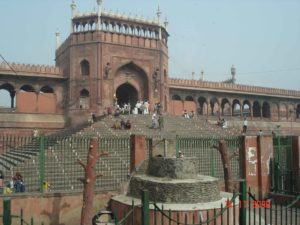
Jama Masjid entrance Gate – Old Delhi
Despite the dusty position of our hotel everything was up to standard and we enjoyed a good breakfast. On the bus the sights and sounds of early morning were exciting and some very sobering. On the footpaths in different areas we saw families with little children still asleep on the hard pavement or along the roadside, early risers washing under a single tap for their morning ablutions.
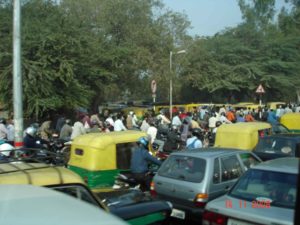
Traffic chaos New Delhi
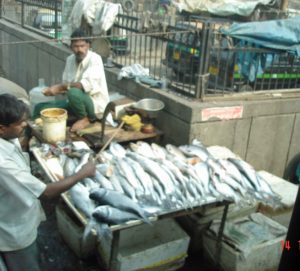
Catch of the Day
Along the city roads traffic chaos of tuk tuk’s, motor bikes,bicycles and man power. Open stalls along the road with fruit; fresh fish in abundance after a good nights catch.
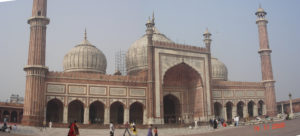
Jama Masjid in Old Delhi
Jama Masjid – Old Delhi
From New Delhi we visited the Jama Masjid in Old Delhi , the largest Mosque in India. Here we had to take off our shoes, allowed to wear socks only, all bags and camera’s left outside but safely looked after for a small fee. If you paid an extra fee you were also allowed to take your camera in and take photo’s, worth it. Just remember, always be respectful in any place of religion.
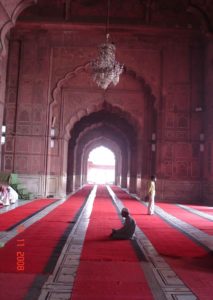
Jama Masjid Islamic Mosque Old Delhi
I’ve never been inside a mosque before, and never seen one on this scale. Built by Mughal Emperor, Shah Jahan between 1644 and 1656 when it was completed. It has three gates, four towers and two 40 meter high minarets. Constructed from red sandstone and white marble it is a very impressive piece of architecture, covering an area of 1200 square meters and can accommodate 25,000 persons. The interior is equally impressive in red sandstone with white marble floors that have a black inlay design to represent a prayer mat.The famous markets of Old Delhi are nearby however decided to give them a miss as it had rained heavily in the area overnight, ground pretty slushy to walk or even ride through. Almost directly opposite in the distance through the smog we could see the walls of the famous Red Fort. Shah Jahan was responsible for the building of the Red Fort and the Taj Mahal.
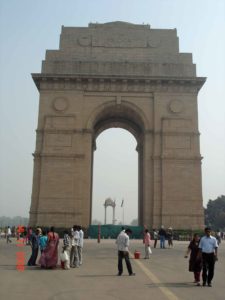
India Gate
Our tour moved on to the India Gate at the eastern end of Rajpath, a two mile long avenue for parades with lawns, gardens and fountains either side. The India Gate is a famous war memorial to the British Indian army in the first world war. Serviceman’s names are inscribed on the Gate. East of the India Gate is a 73 foot cupola,which you can see through the India Gate. It once housed a statue of King George V, since removed to Coronation Park in 1960. A street seller appeared very popular with the locals so couldn’t resist trying some of the local food.
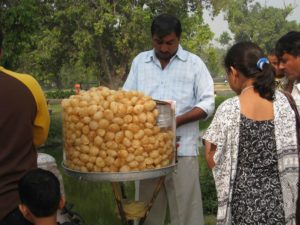
From the bus we could see so many old ruins throughout New Delhi, I guess it would be impossible to explore them all. The morning had passed very quickly and we headed to Rajdhani Restaurant in Connaught Place. A really nice restaurant, all had a tray with half a dozen small dishes of traditional food to taste. The waiter explained what each dish was, and what to eat with it, as he added it to the tray. To finish the meal our host offered a glass of traditional salted buttermilk, which was different but quite refreshing on the palate. The food was very interesting and tasty; an enjoyable experience and introduction to different Indian dishes. This was just a taste experience, lunch came later.
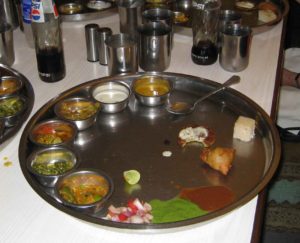
Rajdhani Restaurant
We then spent time at Connaught Place, some found some nice shops in the arcades and went to try on sari’s, came back with beautiful silk garments. Found the street sellers with their vibrant colored spices interesting, nearby the monkey palace which is over run by not so friendly and slightly mangy looking monkeys. I didn’t find this area particularly interesting.
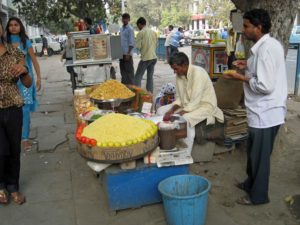
On the bus again we arrived at the Humayun’s Tomb complex. As you enter the complex from the west, there are a number of other interesting tombs and mosques before you reach Humayun’s tomb. The first is the entrance gate to Bu Halima’s tomb and garden, not much is known about this lady, but obviously someone cared enough to build the gate, garden and large tomb for her.
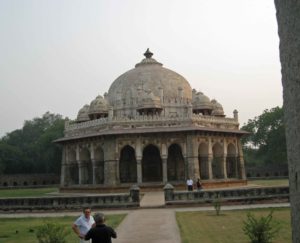
Isar Khan’s tomb
Isar Khan’s tomb
The next you see is the tomb and mosque of Isar Khan. Isar Khan’s tomb (1547AD) predates Humayan’s tomb by some 20 years. It is a very elegant tomb with attractive canopies,glazed tiles and lattice screens and is surrounded by an octagonal garden. Built during the lifetime of Isa Khan, an Afghan noble in the court of Shah Suyri’s dynasty who fought against the Mughals. Along the western side of the enclosure is a three bay wide mosque with a handsome red sandstone central bay and striking mihrab (prayer niches). Ultimately the entire family of Isa khan are buried in this tomb. Until the early 20th century an entire village lay within these walls.
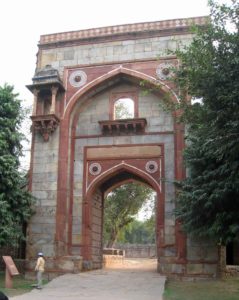
Arab Serai Gate
Arab Sarai Complex and tombs
The next complex is through the impressive 14 metre high Arab Serai Gate(1560-1561), decorated with red sandstone and glazed tiles. Inside lie ancient ruins of the Afsarusala tomb (officers tomb) and Mosque of a noblemen in Akbar’s court. Akbar the great was the third Mughal Emperor(1555-1605). A marble grave inside dated 1566-67AD.
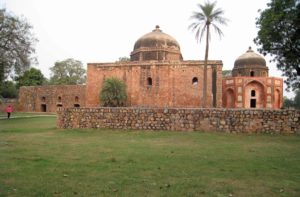
Mosque,tombs,rest house for Persian craftsman.
The mosque itself dates from the same period as it stands next to the tomb and lies within the Araba Sarai complex. The buildings on the left are part of the Araba Sarai or rest house, built by Bega Begum around 1560-1567 to house the Persian craftsmen who came to work on Humayun’s Tomb. The size and splendor of the different tombs show the era, the wealth and importance of the deceased, and of course ,most other tombs in this complex pale in comparison to that of Humayun’s tomb.
Humayun’s tomb – Garden Tombs
A magnificent structure, a forerunner to the Taj Mahal, designed by Persian architect Mirak Mirza Ghyas. Humayun’s wife, Bega Begum chose the architect and commissioned him to build the tomb and the Char Burg gardens, a style typical of Persian gardens and the first of many garden tombs built on the Indian continent. Four central axial courses define Char Bugh gardens quadrilateral layouts, the gardens spread over 13 hectares. Humayun’s cenotaph stands alone in the main chamber, the real grave lies in the basement below. The tomb has within it over one hundred graves earning it the name ‘Dormitory of the Mughals’.
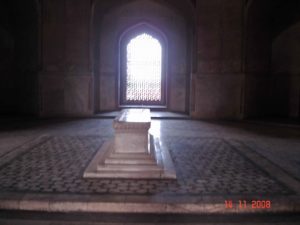
Humayun’s cenotaph
A brief visit to Lakshmi Narayan Hindu temple, only allowed into two small shrines and no cameras. Hindu Gods very different. More on this when we reach Varanasi. The outer appearance of the temple a very different style, brightly painted, almost garish in appearance. Inaugurated by Mahatma Gandhi and built by industrialist and philanthropist, Baldeo Birla and his son, between 1933 and 1939 so fairly recent compared to most buildings seen to date (16th century). Sometimes referred to as the Birla Mandir temple.
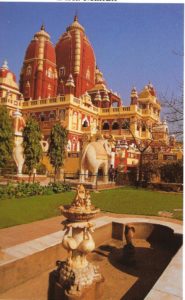
Side temples devoted to Shiva,Krishna and Buddha. Lakshmi is surrounded by beautiful gardens covering 7.5 acres. The temple, a major attraction in Delhi for thousands of devotees of the Hindu festivals Janmashtami and Diwali.
A break for lunch after a very busy morning, and then onto the Qutab Complex UNESCO Heritage Site, and the Tower of Qutab Minar.
Related Posts:
- Incredible India|Delhi City
- Terracotta Army| Emperor
- Snapshot of Cambodia Kampuchea
- China a most attractive destination|Top ten places to visit in China
- Flight of the Giraffes Duba Plains
- Magnetic Island a suburb of Tropical Townsville
- Sensoji-Asakusa Kannon Temple Tokyo Japan
- Romantic Road-Attractions Germany
- Skydeck 88 Experience-a great place to visit in Melbourne
- Jewels of Venice
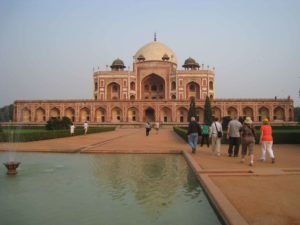
Speak Your Mind